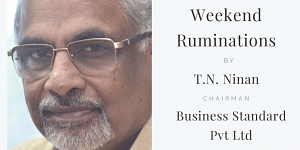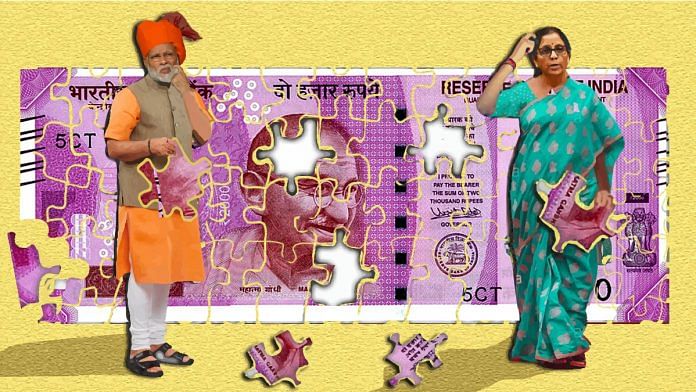No one can accuse the second Modi government of inaction. If anything, its first 100 days have seen frenetic activity — historic action in Jammu & Kashmir, lots of legislation passed through Parliament, and lots of summitry by the prime minister — Bhutan, G7, the UAE, Russia, etc. Coming up soon is China, after an address to the UN General Assembly. Also worth noting is the critical difference in tone and approach that has resulted from the replacement of the late Arun Jaitley by Amit Shah as No. 2 in the Cabinet.
 For all that, one is inclined to go back to Bill Clinton’s campaign slogan: “It’s the economy, stupid!” Not that the economy has been ignored in these past 100 days, far from it. There is the mega-merger of government banks, the Budget and further opening up to foreign investment, while some of the new legislation is economic in content: Two new labour codes, and an amendment to the bankruptcy law. On its part, the Reserve Bank has announced two rate cuts. Yet, other than the finance minister, the rest of the government in New Delhi seems strangely disengaged with macro-economic policy issues. This is hard to understand when the economy faces an escalating employment problem, a crisis in farming, stagnation in manufacturing, and slack exports.
For all that, one is inclined to go back to Bill Clinton’s campaign slogan: “It’s the economy, stupid!” Not that the economy has been ignored in these past 100 days, far from it. There is the mega-merger of government banks, the Budget and further opening up to foreign investment, while some of the new legislation is economic in content: Two new labour codes, and an amendment to the bankruptcy law. On its part, the Reserve Bank has announced two rate cuts. Yet, other than the finance minister, the rest of the government in New Delhi seems strangely disengaged with macro-economic policy issues. This is hard to understand when the economy faces an escalating employment problem, a crisis in farming, stagnation in manufacturing, and slack exports.
Clinton’s old slogan did nothing more than state the obvious. But sometimes, like today, the obvious needs to be stated. Especially when Modi’s latest economic initiatives, like his earlier ones, involve the spending of government money on handouts for farmers, a government-funded health insurance programme, and the like. With the slow economic tempo undermining tax revenue assumptions for the second year in a row, the money required for these and other programmes may simply not be there.
Also read: Modi govt’s bank bailouts seen distracting focus from growth slump
There are larger ramifications to economic under-performance. In a changing world order where nation-state leviathans seek free rein, the country’s external heft flows directly from its strategic projection and the future promise of its markets. If growth stalls, the country is less likely to be viewed in the region and further afield as a natural foil to China, or in economic terms, as the next China. Bear in mind that these perceptions lay at the heart of the US’ re-engagement with India, beginning with the nuclear initiative under the second President Bush.
If America decides now that India “has been over-sold”, as some observers in Washington are beginning to say, there will be a diplomatic cost. India may no longer get carve-outs from sanctions regimes, and other countries may not automatically take India at its word, in the face of Pakistan’s protests, on the Kashmir issue. Meanwhile, the defence forces lose out relatively because there isn’t enough money for the acquisition of submarines and destroyers while China’s navy expands at a frenetic pace and expands its presence in the Indian Ocean. That reduces India’s utility as a strategic partner.
On top of this, if our businessmen, ever in search of protective tariff walls, persuade a naturally nationalist government to stay out of the mega-trade deal that is the RCEP (Regional Comprehensive Economic Partnership), then India will have turned its back on the most dynamic part of the world economy. On its part, the government seems to have decided that ‘Make in India’ will work only by aiming at import substitution — which usually translates into higher tariffs. If the history of world trade and economic performance (and India’s own policy-making history) says anything at all, it is that this strategy does not work in the long run.
All of this makes it compelling that the key personages in the government, and that includes the prime minister, engage directly and actively to prevent the current downturn from morphing into 1980s-level growth rates. Modi in particular needs to put aside his lack of engagement with macro-economic policy, and develop a coherent understanding of how the different elements of a revival strategy (different from a “package” of announcements) mesh together — and then to stay the course on what is required to be done, because structural issues don’t change with the season.
By Special Arrangement with Business Standard
Also read: Modi’s bank mergers have come too late to avoid an economic crisis




1. Views expressed in this article provoke readers like me to think about various problems related to economy, and possible contribution of our Intellectuals (or what are called the Think Tanks) as also political leadership to solve those problems. I firmly believe that we have to be positive and pessimism has to give way to new vigour to deal with whatever issues which we have. 2. I know that there cannot be unanimity of views on a major issue of economic slowdown which we are facing today. My query in this regard is this: can there be broad agreement on ways to boost our economy? 3. As I see it, there are a few issues which need to be addressed to on a priority. (a) Giving a boost to industrial sector, particularly those who are in trouble right now. (b) Increasing farm productivity and thereby farmers’ income. (c) Creation of a favourable environment for generation of new self-employment opportunities in rural parts of our vast country’ (b) Creation of new job opportunities, mainly in the private sector even we make efforts like the one of mergers of Public Sector Banks. 4. I think the way our politicians react to current economic crisis is immature and a curse of our democracy. 5. When would our politicians look at the problems of economy as opportunity to set things in order? Is anyone enjoying the economic slowdown? 6. Is it not true that the economic slowdown, which is being experienced not only in our country but also in many Asian economies, has a direct relationship with international factors, especially USA-China trade war? 7. Citizen-voters like me wish that elder political leaders like former PM and economist Dr Manmohan Singh should offer a hand of cooperation to NDA government and make concrete suggestions for implementing measures to ensure that the country’s economy slowly but surely comes out of recessionary cycle.
The author is either naive or pretending. Does anyone seriously think that the FM is acting on her own? The truth is that this is no Vajpayee’s government with bold economic ideas. This is a government headed by an extreme left wing Marxist who makes Communists look right wing.
That is an original thought – Modi as an extreme left wing Marxist. I would be really interested in reading your idea expanded.
Difficult to believe there is any lack of centralisation and direct control. Not just for the economy or national security. My submission would be at 180 degrees. Empower individual Cabinet Ministers, assisted by MoSes and exceptionally competent Secretaries, set high standards, hold them responsible. Governance 101 for India : It cannot be run from a nuclear bunker.
The main reason for drop in CV sales is GST. Post GST the deployment of CVs has dropped to less that 50% for carrying the same volume of goods. A round trip for truck that would take 12 days now takes only 5 days with no octroi and other restrictions. There must be similar reasons for private cars, like the abundant availability of the Ola and Uber. The status attached to car owning is on the decline, with the problems of parking and traffic jams it is definitely convenient to use the cab. Why tie down the money in a car which will be mostly parked at home. Is it not for all of us to put forward such possibilities may be even with suggestion to overcome them. There is no dearth of intellectuals and wise men in this country if only they change the approach, realistic solutions will be forthcoming. We need to get beyond the five fingers of the ex-FM, who was recommended for consultations by the ex-PM.
In Socialist Bharat, economy is a dirty word, capitalism is bad word and socialists are gods.
Ninan has correctly listed and analyzed the issues but stopped short of putting down what Modi should do if and when he takes charge of macro-economy. Ninan has not said specifically that Modi should show courage to run a large fiscal deficit for a few years (with attendant consequences) while slashing taxes and improving business friendliness of the government but not limiting his social expenditure. There is no other magic formula for turning around the economy in a sustainable manner and is much better than government starting a few infrastructural projects hoping to kick start the economy. Economists ought to say this confidently that we accept these risks and go for the jugular and create appropriate environment for such bold policies for a few years. Otherwise, it is all usual nonsense by economists and financial journalists without any sense of responsibility.
Of all the lazy ideas that sprout like mushrooms after a shower, running a large fiscal deficit is the worst. India is already running a deficit of close to 10%. Aur kitna hona chahiye …
Nirmal Sitharamam was made Finance Minister only so that the PM could control the affairs of the ministry on a more hands on basis. All her actions are on the basis of a nod and prod from PMO.
The PM and his ministers generally lack a sense of balance, even the so called well performing ones.
The proposal for speedy electrification of automobiles, especially two wheelers and increased fines for road traffic rule violations are an example of it. Buying a car never made financial sense to 80% of Indians. The high fines and the publicity to it only makes one realize that it’s not worthwhile to buy one, making the slowdown deeper.
The
NO. Modi, don’t engage! Typically, economy flourishes inspite Of Government, not due to Government. If you can, stay aloof like Manmohan Singh and keep the seat warm. No new schemes. Baboos will definitely screw up the execution. Do nothing, maybe, go on a few sightseeing trips to keep yourself occupied. Write a book or something.